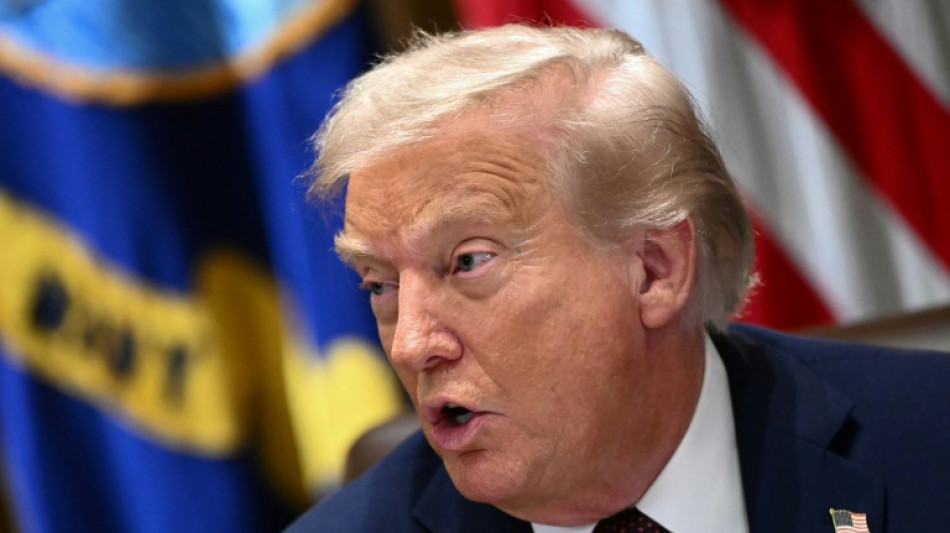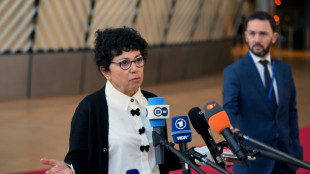
-
 Where things stand on China-US trade after Trump and Xi talk
Where things stand on China-US trade after Trump and Xi talk
-
Sri Lanka targets big fish in anti-corruption push

-
 NY elects leftist mayor on big election night for Democrats
NY elects leftist mayor on big election night for Democrats
-
Injured Jordie Barrett to miss rest of All Blacks tour

-
 Asian markets tumble as tech bubble fears grow
Asian markets tumble as tech bubble fears grow
-
Pay to protect: Brazil pitches new forest fund at COP30

-
 Australia pick 'impressive' Weatherald in first Ashes Test squad
Australia pick 'impressive' Weatherald in first Ashes Test squad
-
Iraq's social media mercenaries dying for Russia

-
 Young leftist Trump foe elected New York mayor
Young leftist Trump foe elected New York mayor
-
Concerns at ILO over expected appointment of close Trump advisor

-
 Venus Williams to return to Auckland Classic at the age of 45
Venus Williams to return to Auckland Classic at the age of 45
-
No deal yet on EU climate targets as COP30 looms

-
 Typhoon death toll climbs to 66 in the Philippines
Typhoon death toll climbs to 66 in the Philippines
-
NATO tests war preparedness on eastern flank facing Russia

-
 Uncapped opener Weatherald in Australia squad for first Ashes Test
Uncapped opener Weatherald in Australia squad for first Ashes Test
-
Liverpool down Real Madrid in Champions League, Bayern edge PSG

-
 Van Dijk tells Liverpool to keep calm and follow Arsenal's lead
Van Dijk tells Liverpool to keep calm and follow Arsenal's lead
-
PSG left to sweat on injuries to Dembele and Hakimi

-
 Reddit, Kick to be included in Australia's social media ban
Reddit, Kick to be included in Australia's social media ban
-
Ex-Zimbabwe cricket captain Williams treated for 'drug addiction'

-
 Padres ace Darvish to miss 2026 MLB season after surgery
Padres ace Darvish to miss 2026 MLB season after surgery
-
Diaz hero and villain as Bayern beat PSG in Champions League showdown

-
 Liverpool master Real Madrid on Alexander-Arnold's return
Liverpool master Real Madrid on Alexander-Arnold's return
-
Van de Ven back in favour as stunning strike fuels Spurs rout

-
 Juve held by Sporting Lisbon in stalling Champions League campaign
Juve held by Sporting Lisbon in stalling Champions League campaign
-
New lawsuit alleges Spotify allows streaming fraud

-
 Stocks mostly drop as tech rally fades
Stocks mostly drop as tech rally fades
-
LIV Golf switching to 72-hole format in 2026: official

-
 'At home' Djokovic makes winning return in Athens
'At home' Djokovic makes winning return in Athens
-
Manchester City have become 'more beatable', says Dortmund's Gross

-
 Merino brace sends Arsenal past Slavia in Champions League
Merino brace sends Arsenal past Slavia in Champions League
-
Djokovic makes winning return in Athens

-
 Napoli and Eintracht Frankfurt in Champions League stalemate
Napoli and Eintracht Frankfurt in Champions League stalemate
-
Arsenal's Dowman becomes youngest-ever Champions League player

-
 Cheney shaped US like no other VP. Until he didn't.
Cheney shaped US like no other VP. Until he didn't.
-
Pakistan edge South Africa in tense ODI finish in Faisalabad

-
 Brazil's Lula urges less talk, more action at COP30 climate meet
Brazil's Lula urges less talk, more action at COP30 climate meet
-
Barca's Lewandowski says his season starting now after injury struggles

-
 Burn urges Newcastle to show their ugly side in Bilbao clash
Burn urges Newcastle to show their ugly side in Bilbao clash
-
French pair released after 3-year Iran jail ordeal

-
 EU scrambles to seal climate targets before COP30
EU scrambles to seal climate targets before COP30
-
Getty Images largely loses lawsuit against UK AI firm

-
 Cement maker Lafarge on trial in France over jihadist funding
Cement maker Lafarge on trial in France over jihadist funding
-
Sculpture of Trump strapped to a cross displayed in Switzerland

-
 Pakistan's Rauf and Indian skipper Yadav punished over Asia Cup behaviour
Pakistan's Rauf and Indian skipper Yadav punished over Asia Cup behaviour
-
Libbok welcomes 'healthy' Springboks fly-half competition

-
 Reeling from earthquakes, Afghans fear coming winter
Reeling from earthquakes, Afghans fear coming winter
-
Ronaldo reveals emotional retirement will come 'soon'

-
 Munich's surfers stunned after famed river wave vanishes
Munich's surfers stunned after famed river wave vanishes
-
Iran commemorates storming of US embassy with missile replicas, fake coffins


Trump moves to end US tariff exemption for small packages
An approaching US deadline to end tariff exemptions on small parcels has tripped up global deliveries to the world's biggest economy, with some businesses halting shipments to American consumers and mulling price hikes.
Come Friday, President Donald Trump's administration is abolishing a rule that allows packages valued at $800 or below to enter the United States duty-free.
Instead, packages will either be subject to the tariff level applicable to their country of origin, or face a specific duty ranging from $80 to $200 per item.
Trump's trade adviser Peter Navarro told reporters that closing this "loophole" helps restrict the flow of "narcotics and other dangerous and prohibited items" while bringing fresh tariff revenues.
But the monthlong lead time Trump's order provided has sparked a frenzy.
Postal services, including in France, Germany, Italy, India, Australia and Japan, earlier said most US-bound packages would no longer be accepted.
The UK's Royal Mail, which took a similar step, announced new services Thursday for customers to continue sending goods to the United States.
On Tuesday, the United Nations' Universal Postal Union said 25 member countries' postal operators had suspended outbound postal services to the country.
"Foreign post offices need to get their act together when it comes to monitoring and policing the use of international mail for smuggling and tariff evasion purposes," Navarro added Thursday.
US officials maintain that just five percent of duty-free small package shipments arrived via the postal network, while most went through express couriers.
Yet, the impending change has brought confusion and concern to small businesses.
- Delays, cost hikes -
UK retailer Liz Nieburg told AFP she had stopped shipping products to US customers while the Royal Mail worked out a system to honor the changes.
US buyers form about 20 percent of sales at her online business SocksFox, which sells socks, undergarments and sleepwear.
She sees little choice but to hike prices if new duties are here to stay: "Our margins are too tight to be able to absorb that."
The Trump administration has imposed tariffs in rapid succession this year.
Cornell University professor Li Chen warned that it takes time for postal services to establish systems for duty collection: "It's not like there's a switch you can turn on and turn off."
"On the consumer side, there will be potential delays, because now all the parcels have to clear customs," Chen added. Prices may also rise if businesses pass on the tariffs.
He expects the impact on small businesses to be "much greater," as larger firms can absorb shocks.
These include businesses like Chinese-founded consumer platforms Shein and Temu, which were hit when Washington ended the exemption for China-origin products this year.
They might have to raise costs, Chen said, but they are not fully dependent on US consumers.
Ken Huening, whose California-based business CoverSeal manufactures outdoor protective covers in China and Mexico, has had to eliminate free shipping for customers.
While he had benefited from the duty-free exemption, the hit to China and now Mexico is posing challenges.
"Textile and manufacturing is not available in the US currently," Huening said. "It might be in the future, but by that time, we're all out of business."
- Confusion -
"It's a super confusing time for our customers," said Haley Massicotte, who runs Canada-based cleaning products company Oak & Willow.
She said US consumers do not always understand how tariffs work, and how they might have to bear added costs.
"We are going to do everything in our power to not raise prices," she stressed.
Similarly, ceramics retailer Sarah Louise Jour in Bangkok is trying to keep shipping costs down after facing issues with Thailand's postal service.
This forced her to tap more expensive services for shipments to US buyers, constituting some 90 percent of her business.
"I don't have time to worry, because I have to think about my team," she said. "I have rent I need to pay for the office."
While she expects sales to hold up over the holidays, the outlook is murkier afterwards.
Massicotte said: "This tariff war is just going to hurt the American and the Canadian consumer, especially small business owners."
J.AbuHassan--SF-PST
